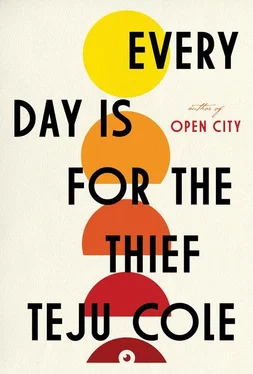Abuja, Nigeria’s capital city, rises out of the Sahel like a modernist apparition. The avenues are clean and broad, and the government buildings are imposing, with that soulless and vaguely fascistic air common to capital cities from Washington, D.C., to Brasília. The National Mosque is a gigantic sci-fi fantasy, like a newly landed alien mother ship. The National Cathedral, a spiky modernist confection, is nearing completion. These houses of worship, in competition with each other for prestige, are two of the most prominent buildings on the city’s skyline. The Thai restaurant to which my friends take me for dinner is as tastefully appointed as any I have seen elsewhere in the world. It is also far more expensive than most Nigerians can afford. The bowling alley we go to afterward has neon lanes, thumping music, and fashionable young people. But are these the signs of progress? Yes, partly. Business is booming, there is free enterprise and, with it, the hope that people might be lifted out of poverty.

But it is as yet a borrowed progress and it is happening in the absence of the ideological commitments that can make it real. The president of the Federation is unable to get away from constant God talk, and in this he is very much like his constituents. President Obasanjo’s hobbyhorse is the “image” of the country. He believes that the greatest damage to Nigeria is being done by critics. These unpatriotic people are, in his opinion, the ones spoiling the country. He insists that the only real flaw is in the pointing out of flaws. One should only say good things. After all, no society can claim perfection.
While the buildings and roads of the capital city suggest a rational, orderly society, the reality is the opposite. Supernatural explanations are favored for the most ordinary events. Uncle Tunde told me a story about his father, who had passed on a few years ago, a jovial, chain-smoking fellow that I met twice as a child. For years, the old man never went to bed without having a half-pint bottle of his favorite tonic: the stash of Guinness Stout that he kept hidden under his bed. He eventually died peacefully in his sleep, at the impressive age of 106. But after his death, there were still family members who muttered that someone must have used black magic on him. W’on se baba yen pa ni: someone did the old man in. Nothing happens for natural reasons. There’s a widespread belief in the agency of magic and malefaction. In addition to this animism is the recent epidemic of evangelical Christianity that has seized the country, especially in the south.
Church has become one of the biggest businesses in Nigeria, with branches and “ministries” springing up like mushrooms on every street and corner. These Christians are militant, preaching a potent combination of a fear of hellfire and a love of financial prosperity. Many of the most ardent believers are students in the secondary schools and colleges. This is the worldview in which prayer is a sufficient solution for plane crashes. Everyone expects a miracle, and those who do not receive theirs are blamed for having insufficient faith. Partly in response to this, and partly from other internal urgings, Islam has also become extreme, particularly in the north. Some of the northern states, such as Zamfara, are de facto theocratic entities in which sharia is the law of the land. Staying opposite the Zamfara State House in Abuja, I could not sleep for the constant wailing emanating from the official mosque in the compound.
Nigeria’s disconnection from reality is neatly exemplified in three claims to fame the country has recently received in the world media. Nigeria was declared the most religious country in the world, Nigerians were found to be the world’s happiest people, and in Transparency International’s 2005 assessment, Nigeria was tied for third from the bottom out of the 159 countries surveyed in the corruption perceptions index. Religion, corruption, happiness. Why, if so religious, so little concern for the ethical life or human rights? Why, if so happy, such weariness and stifled suffering? The late Fela Kuti’s prophetic song “Shuffering and Shmiling” still speaks to the situation. This champion of the people was also the fiercest critic of the people. He spoke fearlessly to our absurdities. “Shuffering and Shmiling” was about how, in Nigeria, there is tremendous cultural pressure to claim that one is happy, even when one is not. Especially when one is not. Unhappy people, such as grieving mothers at a protest march, are swept aside. It is wrong to be unhappy. But it is not necessary to get bogged down in details when all we need is the general idea.
The Ojodu — Berger Bus Terminus is connected to the expressway by a steep dirt road. Hundreds of buses and cars cross at this narrow point every hour, much like a great herd fording a brook and clambering up the opposite slope. Driving south from there, the old toll gate into Lagos is only ten minutes away. On a day when the traffic is light, it does not take long to pass by the districts of Alausa and Oregun. From the high bridge at Ojota, where the length of Ikorodu Road stretches into the city as far as the eye can see, one has a panoramic view of the thickly populated area below: cars, molues, danfos, people. Perpetual movement. It is familiar. When we lived in Opebi, I traveled the route hundreds of times as a child on school-day mornings. Now those hundreds of journeys come to mind as if they were a single vivid one. Ahead, a gigantic recumbent woman purrs from a billboard, “Who are you sleeping with tonight?” It is an advertisement for a mattress manufacturer. Next to it is another billboard, featuring young people dancing at a party. The tagline: “No wonder Nigerians are the happiest people on earth.” The sponsor of the billboard is British American Tobacco.
As we pass Ojota, I see something else, set in a low plain to the right, just off the expressway. There are high walls with ramparts that mimic a medieval castle. Inside, visible from the road, is a dense cluster of buildings surrounding a busy parking lot. At the entrance of the complex, there is a soaring red gateway: Chinatown. Chinatown in Lagos? But there it is, another signal that we are in a normal place, or a place that aspires to normalcy, like New York, London, Vancouver, San Francisco, with their Chinatowns. This one fits the bill, right down to the giant Chinese characters on the frontage. The Chinese have arrived, and they are visible all over Lagos, as merchants, as contractors, as laborers. This is home to them now. They established the Chinatown complex in 1999, selling bales of cloth, consumer electronics, digital media, kitchenware. Nigerians come in droves, for the cheap prices. But it isn’t an easy life for the Chinese. The merchants have terrible difficulties at the Nigerian ports bringing in their goods. They have to pay hefty bribes, and delivery times are erratic. And, while I am in Lagos, the state government temporarily shuts down all the shops in Chinatown, on the pretext of investigating a compact disc piracy ring.
But not only the Chinese are new to the city. People from all corners of the world have come to take advantage of the newly open economy. Indians, Lebanese, Germans, Americans, Brits. I see them in the restaurants, in shopping malls, at the open markets. They have their own private schools, their own housing estates. When I was little, the sight of people like my mother was remarkable, always subject to stares from adults and cries of oyinbo from little children. Other Caucasians were few and far between, clustered in Ikoyi and on the campus of the University of Lagos. That has changed now. There is a lot of money to be made in Nigeria, and the world in all its colors is here to make it. The self-described “giant of Africa,” closed for so long because of its reputation as a difficult place, is now open. There is now all this activity, as pent-up energy is released, and people are driven by a sense that business is possible. But the past continues to gather around like floodwater. A too easy formulation, but what past do I have in mind? The nation’s, I think. But perhaps I am also thinking of mine, perhaps the two are connected, the way a small segment of a coastline is formed with the same logic that makes the shape of the continental shelf.
Читать дальше













